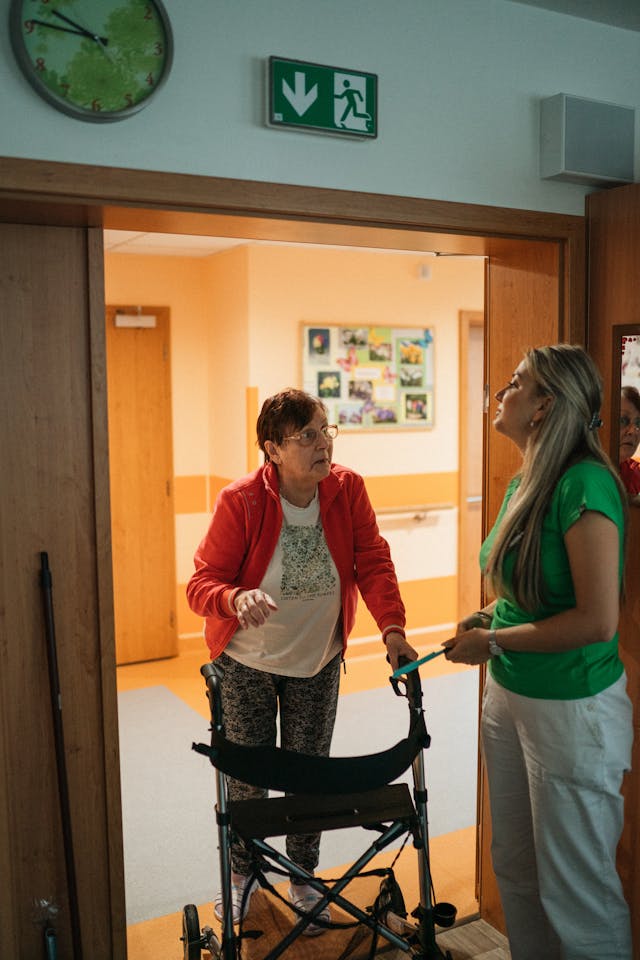
Caregiving for seniors and the elderly is a labor of love that demands immense emotional, physical, and mental resources. Whether you’re caring for a loved one with Alzheimer’s, stroke, or chronic illness, the constant demands can lead to caregiver burnout. Recognizing the signs of burnout and taking proactive steps to manage stress are essential for both the caregiver and the individual receiving care. This comprehensive guide explores various aspects of caregiver burnout in senior and elderly care, offering assessment tips, detailed strategies for managing stress, and emphasizing the importance of finding substitutes and making time for family and self.
Understanding Caregiver Burnout
Caregiver burnout is a state of physical, emotional, and mental exhaustion that can occur when caregivers do not get the help they need or if they try to do more than they are able, physically or financially. Burnout can lead to a withdrawal from loved ones, a decrease in the quality of care provided, and severe health consequences for the caregiver.
Signs of Burnout:
- Emotional Exhaustion: Feelings of being overwhelmed, drained, and emotionally spent.
- Physical Fatigue: Persistent tiredness, difficulty sleeping, and frequent illnesses.
- Mental Health Issues: Increased irritability, anxiety, depression, and mood swings.
- Social Withdrawal: Avoiding social interactions and feeling isolated.
- Decreased Satisfaction: Feeling unappreciated, disillusioned, and a sense of ineffectiveness in the caregiving role.
Caregiver Burnout Assessment
Understanding whether you’re experiencing burnout is the first step towards addressing it. Caregiver burnout assessments can help you gauge your stress levels. These assessments typically include questions about your emotional state, physical health, and overall well-being.
Assessment Tools:
- Caregiver Burnout Scale: This tool measures dimensions such as emotional exhaustion, depersonalization, and personal accomplishment. Regularly completing the caregiver burnout scale can help track changes in stress levels.
- Self-Reflection: Regularly reflecting on your feelings and physical health can help you recognize early signs of burnout.
Signs of Burnout:
- Emotional Exhaustion: Feeling drained, overwhelmed, or emotionally spent.
- Physical Fatigue: Chronic tiredness, difficulty sleeping, and frequent illnesses.
- Mental Health Issues: Increased irritability, anxiety, and depression.
- Social Withdrawal: Avoiding social interactions and feeling isolated.

Challenges and Solutions in Senior and Elderly Care
Caring for seniors and the elderly presents unique challenges that can contribute to caregiver burnout. Understanding these challenges and implementing effective solutions can significantly improve the caregiving experience.
Physical Demands
Challenges:
- Mobility Assistance: Assisting with mobility can be physically demanding and may lead to caregiver injury if not done correctly.
- Personal Care: Helping with activities of daily living (ADLs) such as bathing, dressing, and toileting can be physically exhausting.
Solutions:
- Proper Lifting Techniques: Learning proper techniques for lifting and moving can prevent physical strain and reduce the risk of injury. Utilizing mobility aids such as walkers, wheelchairs, and lift chairs can also alleviate physical demands.
- Ergonomic Tools: Investing in ergonomic tools and adaptive devices can make caregiving tasks easier and more efficient.
Emotional Strain
Challenges:
- Emotional Toll: Watching a loved one decline can be emotionally draining and lead to feelings of helplessness and sadness.
- Role Changes: Transitioning from a family member to a caregiver can create emotional and relational strain.
Solutions:
- Counseling and Therapy: Engaging in counseling or therapy can provide emotional support and coping strategies. Therapy can help caregivers process their feelings and develop resilience.
- Support Groups: Joining support groups offers a platform to share experiences, gain emotional support, and learn coping strategies from others in similar situations.
Medical Management
Challenges:
- Complex Care Needs: Managing chronic illnesses and multiple medications can be overwhelming and require meticulous organization.
- Frequent Appointments: Coordinating and attending numerous medical appointments can be time-consuming and stressful.
Solutions:
- Organizational Tools: Using calendars, medication management apps, and electronic health records can help keep track of medications, appointments, and treatments. Setting reminders and alerts can ensure that no important tasks are overlooked.
- Professional Caregivers: Hiring professional caregivers or home health aides can provide additional support and allow you to focus on other responsibilities. These professionals can assist with medical tasks and provide respite for primary caregivers.

Support Systems
Building a robust support system is crucial for preventing caregiver burnout. Support can come from various sources, including family, friends, professionals, and community resources.
Local Support Groups:
- Community Engagement: Joining local caregiver support groups provides a sense of community and practical support. Regular meetings offer a space to discuss challenges and solutions, share experiences, and receive encouragement.
- Online Forums: Participating in online forums can provide support and advice from caregivers in similar situations. These forums are accessible at any time, offering immediate support when needed.
Respite Care:
- Short-Term Relief: Hiring professional respite care providers can give you short-term relief. Respite care can be scheduled regularly or as needed, allowing you to take breaks and recharge.
- Family Involvement: Enlisting help from family members can distribute the caregiving load and provide a support network. Family members can assist with caregiving tasks or provide companionship to the care recipient.
Finding Substitutes and Making Time for Family and Self

One of the most effective ways to prevent caregiver burnout is to find substitutes, such as respite care providers, family members, or professional caregivers. This allows caregivers to take necessary breaks, ensuring they have time to relax and recharge.
Strategies for Finding Substitutes:
- Respite Care: Hiring professional respite care providers can give you short-term relief. Respite care can be provided at home, in a day center, or through residential programs.
- Family Involvement: Enlisting help from family members can distribute the caregiving load and provide a support network. Family members can take turns providing care, allowing the primary caregiver to take regular breaks.
- Community Resources: Many communities offer resources and services designed to support caregivers, such as adult day care centers, volunteer services, and senior centers. These services can provide socialization opportunities for the care recipient and respite for the caregiver.
Making Time for Family and Self:
- Scheduling Breaks: Regularly scheduling breaks can prevent burnout and provide time for self-care. Even short breaks throughout the day can help reduce stress and improve your overall well-being.
- Engaging in Hobbies: Pursuing hobbies and activities that you enjoy can help reduce stress and improve your overall well-being. Whether it’s reading, gardening, painting, or another activity, engaging in something you love can provide a much-needed mental break.
- Exercise and Relaxation: Incorporating physical exercise and relaxation techniques such as yoga, meditation, or deep breathing exercises can significantly improve mental health. Regular physical activity can boost your mood, reduce stress, and improve your overall health.

Conclusion
Caregiver burnout is a serious issue that requires attention and proactive management. By recognizing the signs, seeking support, and prioritizing self-care, caregivers can maintain their well-being and continue to provide the best possible care for their loved ones. Whether it’s through connecting with support groups, using assessment tools, or finding substitutes to give yourself a break, taking these steps can ensure that you remain healthy and capable in your caregiving role.
Additional Tips:
- Stay Informed: Continuously educate yourself about the specific conditions your loved one is facing. Understanding their needs and the progression of their illness can help you anticipate challenges and find effective solutions.
- Set Realistic Goals: Set achievable goals for yourself and your caregiving tasks. Prioritize the most important tasks and let go of perfectionism.
- Maintain a Healthy Lifestyle: Eat a balanced diet, get enough sleep, and avoid excessive caffeine and alcohol. Maintaining your physical health is crucial for managing stress and preventing burnout.
- Communicate Openly: Keep open lines of communication with other family members, healthcare providers, and support networks. Don’t hesitate to express your needs and ask for help.
- Use Technology: Utilize technology to help manage caregiving tasks
Frequently ask questions
What are the symptoms of caregiver fatigue?
Caregiver fatigue, also known as caregiver burnout, includes symptoms such as:
Emotional exhaustion
Chronic physical fatigue
Increased irritability and anxiety
Depression
Difficulty concentrating
Frequent illnesses
Social withdrawal
What is burnout for caregivers?
Burnout for caregivers is a state of physical, emotional, and mental exhaustion caused by the prolonged and intense stress of caregiving. It often leads to feelings of helplessness, hopelessness, and being overwhelmed by the caregiving responsibilities.
Is compassion fatigue the same as burnout caregiving?
Compassion fatigue and burnout are related but distinct concepts. Compassion fatigue is a form of secondary traumatic stress experienced by caregivers, characterized by emotional and physical exhaustion from the empathy required in caregiving. Burnout is a broader term that includes chronic stress and exhaustion from caregiving responsibilities but doesn’t necessarily involve trauma.
What are the burdens of being a caregiver?
The burdens of being a caregiver include:
Emotional Burden: Dealing with the emotional stress of caring for a loved one.
Physical Burden: The physical strain of caregiving tasks such as lifting and assisting with mobility.
Financial Burden: Potential financial strain from medical expenses and reduced income due to caregiving duties.
Social Burden: Social isolation due to the demands of caregiving, leading to fewer social interactions and support.
Mental Burden: The cognitive load of managing medical care, schedules, and the well-being of the care recipient.
What are the early signs of caregiver burnout?
Early signs of caregiver burnout include feeling constantly tired, overwhelmed, or stressed. You might also experience physical symptoms like headaches or stomach problems, emotional symptoms like irritability or depression, and social symptoms like withdrawing from friends and family.
How can I prevent caregiver burnout?
Preventing caregiver burnout involves prioritizing self-care, seeking support, and taking regular breaks. Utilize respite care, join support groups, and use organizational tools to manage caregiving tasks more efficiently. Make time for hobbies, exercise, and relaxation.
What resources are available for caregivers of seniors and the elderly?
Resources for caregivers include local support groups, online forums, respite care services, adult day care centers, and home health aides. Many communities offer programs and services designed to support caregivers, such as educational workshops and caregiver support networks.
How can I manage the emotional stress of caregiving?
Managing the emotional stress of caregiving involves seeking support through counseling or therapy, joining support groups, and finding healthy ways to express and process your emotions. Regularly engaging in activities that bring you joy and relaxation can also help manage stress.
What should I do if I feel overwhelmed by caregiving responsibilities?
If you feel overwhelmed by caregiving responsibilities, it’s essential to seek help immediately. Reach out to family members, friends, or professional caregivers for support. Utilize respite care services to take a break and recharge. Consider talking to a mental health professional to develop coping strategies.

